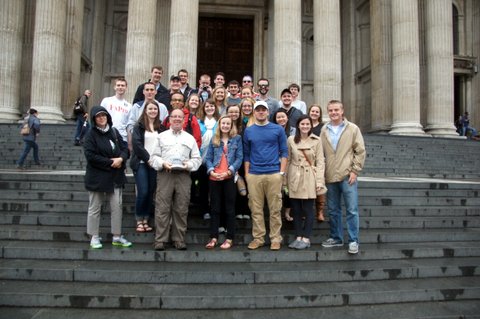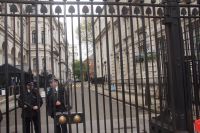The saying is, “’we’re across the pond.” Compared to the Pacific, the Atlantic is a “pond,” which means our trip of 4000 miles from Chicago to London is considerably shorter than any trip from Chicago to my usual stomping grounds in the Far East.
Despite the 8 hour flight, rather than the 14-16 hour flight (thankfully, we flew direct), it still does wonders for your body clock, and can mean a long day. It was for us. We arrived in London at around 6 am. Of course, that means you arrive and there’s no hotel rooms available at least until noon. Great time to tour!
The challenge that faced us was that today is the opening of parliament in England. That’s a big deal because the Queen opens Parliament with a speech written by the prime minister, but she travels from Buckingham Palace to Parliament by coach, with an entourage, which means that the city is under fairly tight security; and, since the route she took pretty much covered the central London area which has most of the tourist places we were supposed to visit, we were lucky we had a creative bus driver who got us around the city.
That was quite an accomplishment, because London is an enormous city, over 600 square miles, with a population over 20 million, most of whom were trying to get to work despite the potential distraction of seeing the queen in royal garb with the crown jewels (the only time each year the crown leaves the Tower of London).
London is an old city, dating at least back to Roman times, and if I were looking for unifiers for the six countries we are visiting, one might be the first “European Union,” the Roman Empire. Turns out, Emperor Hadrian, who defined the northern limits of the Empire when he built a wall in northern England, had a fond spot in his heart for Athens, where he built or rebuilt a number of monuments we’ll see later. Another Roman symbol for this trip (doesn’t work too well in Berlin, and I think Brussels, which were north of the Danube, another of the limnes–limits, as the Romans called it– that separated civilized and barbarian Europe –although, as professor Pana, my colleague, would surely remind me, Romania was the only province in the Roman empire that defied the Danube/Rhine boundaries) (sorry for the long tortured sentence; I plead having been up for almost 40 hours) would be Constantine the Great. Constantine was commanding units in England and France when the emperor died and he made a bid to replace the Emperor and reunite what had been divided by Diocletian. Constantine succeeded, partly in a victory he attributed to Christianity, which led to his conversion and the adoption of Christianity as the official religion of the Greco-Roman world, and in 324, I believe, he founded Constantinople, which is where we will end up in 3 weeks.
As for London, the Romans had a settlement here, called Londonium (which sounds to me like it belonged on the chart of the elements, rather than on a map), that soon became a big city. Today it has over 30 neighborhoods—e.g., Soho presided over by mayors, and two cities—London (the old city, which was the financial center of the British Empire and still is one of the top 3 banking centers, or should I say centres), as well as Westminster, who have Lord Mayors, and there is an overall Lord Mayor, too. The current one has started a bicycle rental program that I hope to take advantage of before we leave.
28 of IWU’s finest are in the St. Giles Hotel, located well in the theater district of London, and within walking distance of most of the major sites. The rooms are tiny—or rather, European. I was looking for the sink, for example, only to realize it is IN the shower. Pretty efficient, cozy.

We drove around the city where we could, passing landmarks such as the London eye, world’s largest ferris wheel; various neighborhoods,monuments to the wars Britain has waged—most notably to Lord Nelson and the Duke of Wellington, victors over Napoleon, one to the grand old duke of York, who, to my dismay, our guide said was a total idiot, marching his 10000 men up and down the hill (and here I thought it was a cute scout song) and sumptuous former palaces (St. James) and parks that constitute some of my memories of London (I think I was last here around 5 years ago). The city’s major features were defined in a devastating

fire in 1666 which led Christopher Wren to rebuild a number of churches (I think I heard over 60, including St. Paul’s, where he is buried), and in World War II, when Hitler’s rockets destroyed much of that financial district, including a half remaining Wren church that is a monument to the 30000 Londoners who died during the blitz.
Our guide, Peter, is the consummate Englishman, with a Harris Tweed jacket, a handlebar moustache, all the right words (“whilst” seems right on him), and a jolly good sense of Anglo-French rivalry.

We had hoped to get to the Mall in time to catch the Queen in coach procession, but got there in time to watch the street sweepers remove all trace of the horse brigades, alas. We contented ourselves with a look at the government buildings from which men like Churchill and Disraeli presided over an empire on which the sun never set, including a look at 10 Downing street.
Our big treat was Westminster Abbey, which has housed the coronation of every British king since about 1000 AD, the graves of most kings until today, and either the graves or monuments to everybody in English history that you’ve ever heard of—musicians like Elgar, and militarists like James Wolfe, and scientists like Newton.
We did not have a formal evening meal, but I suspect most of the students sampled life in the pubs of London. Professor Pana and I met two former students that she was close to who are working in banks in London. Good to see them, to reminisce, and to realize what they are doing to build upon what they had learned at IWU.
In any case, I’m about 6 hours ahead of you, and ready to call it a long day.